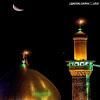Serki Croke, Ukrainian priest, within a group of Ukrainian people, visited the holy city of Kerbala, and made pilgrimage to Imam Hussein (Peace Be Upon Him) in order to have himself acquainted with the heritage of the city and the world’s most tragic event committed against humanity in 61 A.H.
Crok also said:
We, as Christians, all love Imam Hussein (Peace Be Upon Him), and we are so honored to have made a pilgrimage to him today. Christians peacefully live with Muslims in Ukraine; they like Muslims and would like to know the true image of Islam, in addition, they wish to interpret the Noble Quran into their languages.
He also mentioned that Muslims in Ukraine have their freedom to build mosques and practice their own rituals. Moreover, he said that Islam has been noticeably spreading throughout the world; and that was one of the important motives that pushed them to make a pilgrimage to Imam Hussein (Peace Be Upon Him).
He said further that Kerbala influences all those whom are subscribed to different religions, and it drags them to know much more about it.
He and the rest of the group of Ukrainians expressed their increasing love towards Imam Hussein (Peace Be Upon Him) especially after they read about him and found out that he sacrificed himself and companions in order to support the religion of his grandfather; and after they made a pilgrimage to him.
They were very interested in the generous hospitality they received from the people of Kerbala.
Serki Croke, Ukrainian priest, within a group of Ukrainian people, visited the holy city of Kerbala, and made pilgrimage to Imam Hussein (Peace Be Upon Him) in order to have himself acquainted with the heritage of the city and the world’s most tragic event committed against humanity in 61 A.H.

erki Croke, Ukrainian priest, within a group of Ukrainian people, visited the holy city of Kerbala, and made pilgrimage to Imam Hussein (Peace Be Upon Him) in order to have himself acquainted with the heritage of the city and the world’s most tragic event committed against humanity in 61 A.H.
source : abna













